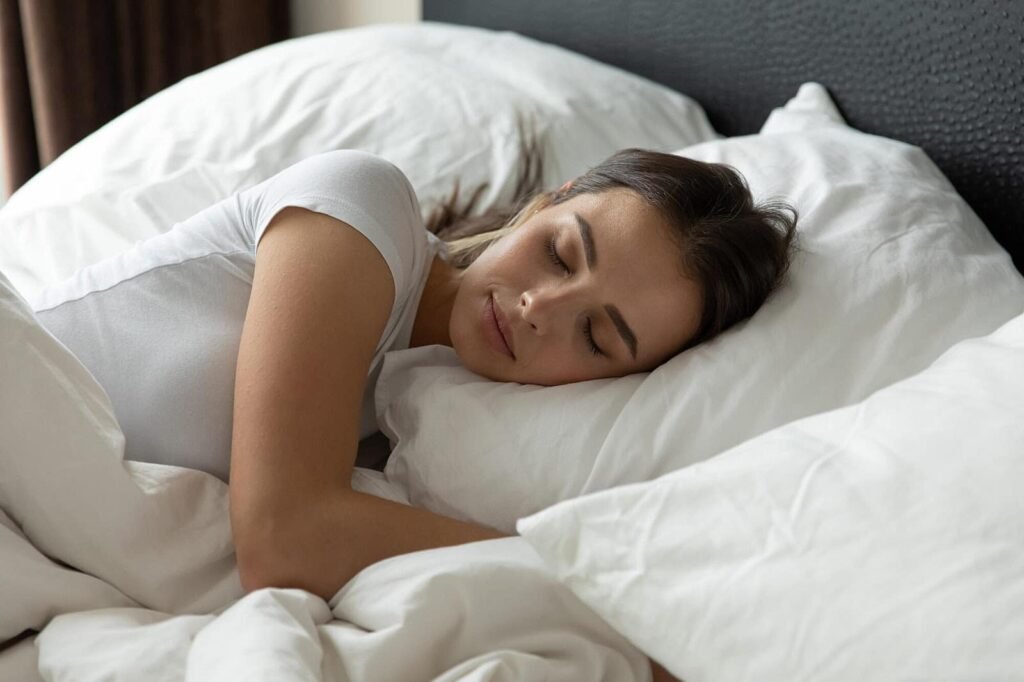If you’re struggling with sleep, you’re not alone. Many people wonder how to sleep better at night. Getting a good night’s sleep is essential for your health and well-being. Luckily, there are simple and effective ways to improve your sleep quality. In this post, we’ll share easy tips that will help you sleep better and wake up feeling refreshed.
Create a Relaxing Bedtime Routine
Why a Bedtime Routine Helps
A relaxing bedtime routine signals to your brain that it’s time to wind down and prepare for sleep. When you establish a calming routine, you are more likely to fall asleep faster and enjoy better sleep quality.
How to Create a Relaxing Routine
- Dim the Lights: Lowering the lights helps your body produce melatonin, a hormone that helps you sleep.
- Read a Book: Reading a book (preferably not on a screen) can calm your mind and get you ready for sleep.
- Take a Warm Bath or Shower: The warm water can relax your muscles and help you unwind.

Stick to a Regular Sleep Schedule
Why Consistency Matters
Going to bed and waking up at the same time every day helps regulate your body’s internal clock, making it easier to fall asleep and wake up naturally. When you stick to a regular sleep schedule, your body becomes accustomed to this rhythm.
How to Set a Sleep Schedule
- Pick a Consistent Bedtime: Choose a bedtime that works for you and stick with it every night, even on weekends.
- Avoid Long Naps: While naps are helpful, avoid long naps late in the afternoon as they may interfere with your nighttime sleep.
- Set an Alarm: Wake up at the same time every morning to keep your sleep-wake cycle consistent.
Make Your Bedroom Comfortable
Why Your Bedroom Matters
Your bedroom environment plays a big role in how well you sleep. A quiet, cool, and dark room is ideal for sleep. By making small adjustments, you can create a space that promotes better rest.
How to Make Your Bedroom Comfortable
- Keep the Room Dark: Use blackout curtains or an eye mask to block out light.
- Set the Temperature: A cool room, around 60-67°F (15-20°C), is ideal for sleep.
- Eliminate Noise: If noise bothers you, try using earplugs or a white noise machine to block out disturbances.
Limit Caffeine and Sugar Before Bed
Why Caffeine and Sugar Disrupt Sleep
Caffeine and sugar can keep you awake and make it harder to fall asleep. These substances are stimulants that interfere with your ability to relax and wind down at night.
How to Avoid Caffeine and Sugar
- Avoid Caffeine in the Afternoon: Limit coffee, tea, and chocolate after 2 p.m. to give your body enough time to process the caffeine.
- Watch Your Sugar Intake: Try not to eat sugary snacks or drinks before bed as they can cause an energy spike that may keep you awake.
Be Mindful of What You Eat and Drink
How Food Affects Your Sleep
The food you eat can influence how well you sleep. Some foods help you sleep, while others can keep you awake. Eating the right foods before bed can promote better sleep.
Sleep-Promoting Foods
- Bananas: Rich in magnesium and potassium, which can help relax muscles and promote sleep.
- Almonds: A great source of magnesium, which can improve sleep quality.
- Warm Milk: Contains tryptophan, which can help your body produce sleep-inducing serotonin.
Get Moving During the Day
How Exercise Improves Sleep
Regular exercise helps your body fall asleep faster and improves sleep quality. Physical activity also reduces stress and anxiety, which can make it easier to relax at night.
How to Exercise for Better Sleep
- Aim for 30 Minutes of Exercise a Day: Whether it’s walking, cycling, or doing yoga, any form of physical activity can benefit your sleep.
- Avoid Exercise Close to Bedtime: While exercise is great for sleep, intense physical activity too close to bedtime can keep you awake. Try to finish exercising at least 3 hours before you go to bed.
Manage Stress and Anxiety
How Stress Affects Your Sleep
Stress and anxiety are common causes of poor sleep. When you’re stressed, your body produces hormones that make it harder to relax. Managing stress is essential for improving sleep.
How to Manage Stress
- Practice Relaxation Techniques: Try deep breathing, meditation, or progressive muscle relaxation to reduce stress.
- Write Down Your Thoughts: If you’re feeling anxious, write down your worries in a journal before bed to clear your mind.
- Try Yoga: Gentle yoga before bed can help calm your mind and body, making it easier to fall asleep.
Limit Screen Time Before Bed
Why Screens Interfere with Sleep
The blue light from phones, tablets, and computers can interfere with your body’s ability to produce melatonin, making it harder to fall asleep. Reducing screen time before bed is an effective way to improve your sleep.
How to Reduce Screen Time
- Turn Off Devices 30 Minutes Before Bed: Try to avoid screens for at least 30 minutes before you go to sleep.
- Use Blue Light Filters: If you need to use your devices at night, consider using blue light filters or apps that reduce blue light exposure.
Conclusion
Now that you know how to sleep better at night, you can take action to improve your sleep. By following these tips, you can create a relaxing bedtime routine, set a regular sleep schedule, make your bedroom more comfortable, manage stress, and more. Remember, quality sleep is essential for your health and well-being. Start making small changes today, and you’ll soon enjoy better sleep and wake up feeling refreshed.











